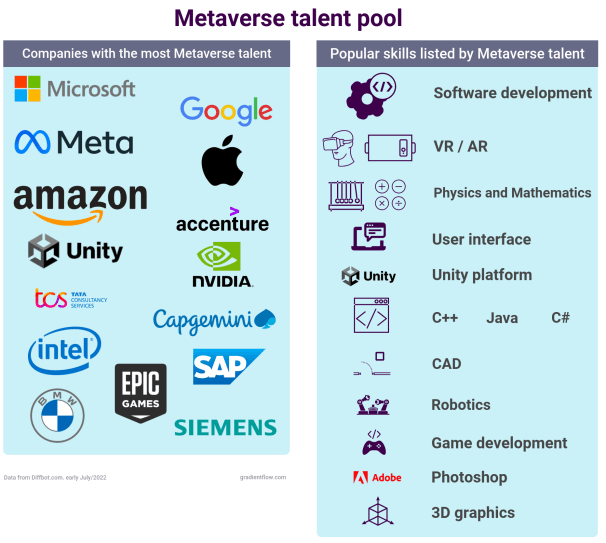Major technology companies are investing in the Metaverse. Enterprises should take early action to stay ahead of the curve.
In the aughts, I was a user and proponent of earlier versions of virtual worlds (specifically of Second Life). Unfortunately, the technology was clunky and the user base never really grew beyond a few hundred thousand users per day. I would often log in to find vast amounts of empty space! Despite the technology’s infancy, there were enough examples to inspire excitement about the possibilities.
In recent months, I have been reading about current-generation virtual worlds and the Metaverse. The technology and tools have improved to the point where key technology companies are investing significant resources to position themselves for the future.
Major tech companies are more invested in Metaverse technologies than blockchain-related tools
This post presents a few high-level metrics that highlight the state of interest in the Metaverse1. As a starting point, we examine media coverage over the last several months. What have popular technology news sources been covering in 2022? Metaverse joins other hot areas (AI and cloud computing) on the list of top topics covered in 2022:

Research Activity and Intellectual Property
Complex foundational technologies often begin in research labs. Based on number of publications, interest in the Metaverse is growing among researchers. There have been over 5,000 research papers and articles published on the Metaverse1 since 2017. The number of publications has grown steadily and is projected to rise more than 25% from 2021 to 2022. In the graphic below, we use Zeta Alpha’s built-in visualization tool (VOSviewer) to display bibliometric networks2 within the corpus of Metaverse papers from 2017 to the present:

As technologies move from research to prototypes and products, intellectual property considerations start to become more prominent. There have been close to 42,000 Metaverse1 related patents published globally since 2022. Moreover, technology and media companies dominate the list of entities with the most number of patent publications:


Talent: Supply and Demand
Next, we characterize both sides of the labor market for Metaverse talent. Looking at job postings in key U.S. technology hubs, we extract postings that mention Metaverse topics1. We also use a topic model to extract the most sought after skills mentioned in these job postings. Once again technology companies dominate the list of companies:

For the supply-side of the labor market, we identified over 59,000 individuals globally who listed Metaverse1 as a skill on their Linkedin profile. Technology and global consulting companies are home to the most number of metaverse talent. We were also able to identify other skills that this pool of individuals listed on their Linkedin profiles:

Closing Thoughts
Since Second Life and other virtual worlds burst onto the scene in the aughts, Metaverse technology has improved substantially. Several metrics indicate a high level of interest in Metaverse related topics among the major technology and social media companies. Based on recent media coverage, there seems to be a lot more interest in Metaverse technologies among major tech companies than in tools related to blockchain. We believe that current investments in Metaverse technologies will lead to simpler tools and platforms that will attract a growing number of users and developers over the next few years. Now is the time for companies from other sectors to launch small projects to explore Metaverse technologies.
To stay up to date, subscribe to the Gradient Flow newsletter.
Related Content:
- A Guide to Data Annotation and Synthetic Data Generation Tools
- Machine Learning Trends You Need to Know
- The AI $100M Revenue Club
- Fastdup: Introducing a new free tool for curating image datasets at scale
[1] To gather data for this post, we used the following simple query/definition:
- metaverse OR “virtual world” OR “augmented reality” OR “virtual reality”
For a comprehensive introduction to, and a more precise definition of, the Metaverse, we recommend Mattew Ball’s excellent new book (The Metaverse: And How it Will Revolutionize Everything).
[2] Bibliometric networks are citation, co-citation, bibliographic coupling, keyword co-occurrence, and coauthorship networks.

